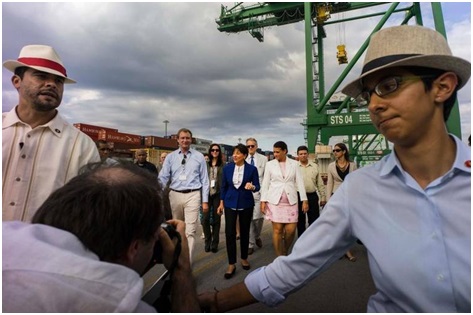Despite White House Opening, Exports to Cuba Continue to Drop
By Chris Adams, McClatchy Washington Bureau

U.S. agricultural and food exports to Cuba continued dropping in recent months, despite this being the year the United States is working to substantially open trade with the island nation.
In August, exports of food and agricultural products authorized under a 2000 trade law dropped to $2.3 million, according to new data from the U.S.-Cuba Trade and Economic Council.
That’s off substantially from the start of the year — despite the much-ballyhooed thawing of trade and diplomatic relations with Cuba. Announced in December by President Barack Obama, the opening aims to undo a decades-old policy the White House considers outdated and ineffective. It already has led to renewed diplomatic relations with Cuba, and American farmers are particularly excited about the potential for a thriving market with 11 million people just 90 miles from U.S. shores.
So far this year, however, food and agriculture exports to Cuba are going down, not up.
$14.4 million in goods were exported in August 2014
In December 2014, the month Obama announced the first initiatives, exports to Cuba were $25.2 million, according to the trade council’s data. They dropped to $3.3 million this past July and then $2.3 million in August.
A year ago, in August 2014, exports were $14.4 million.
John S. Kavulich, president of the trade council, said that some short-term issues explain part of the drop. Poultry shipments, for example, dropped due to avian flu issues but are expected to rise in October.
It’s also unclear what an additional round of changes announced in September will have on shipments to Cuba. Those changes include giving U.S. firms the ability to maintain physical operations in Cuba, a significant help for firms looking to boost business ties with the island.
But to Kavulich and other experts, the Cuban government — which controls the purchases of such food and agricultural products — is slowing its activity with U.S. firms as a way to exert leverage on the U.S. political process, hoping for even greater concessions.
The concessions made by the president were significant — and yet you don’t see any evidence of Cuba reforming their economy or addressing U.S. concerns such as certified claims or human rights.
Jason Poblete, international regulatory lawyer
While the trade embargo on Cuba is still in place, the changes announced by the Obama administration have chipped away at it. But significant restrictions remain — particularly one that prohibits U.S. growers from selling to Cuba on credit. Getting that restriction lifted is a goal for both the Cuban government and many U.S. farm groups.
“The concessions made by the president were significant — and yet you don’t see any evidence of Cuba reforming their economy or addressing U.S. concerns such as certified claims or human rights,” said Jason Poblete, an international regulatory lawyer with Poblete Tamargo LLP. “My sense is that nothing that has happened this year is going to move the needle in any appreciable way. They’re playing a political game of chicken, hoping Congress will ease sanctions, especially the credit prohibitions.”
U.S. growers are still prohibited from selling agricultural products to Cuba on credit
There are bills in Congress to ease the embargo, and they do have bipartisan support. But they also have strong opposition and face stiff odds of moving this year.
“It’s obvious that we’re interested in normalizing the relationship, but it’s also becoming more and more apparent that the Cubans are slowing this down and tapping on the brakes,” said Carl Meacham, Americas Program Director at the Center for Strategic and International Studies, a Washington think tank.





